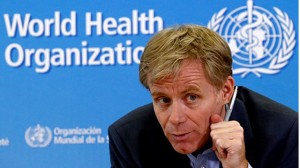 GENEVA, Switzerland (Reuters) – Liberia may be seeing a decline in the spread of Ebola, with falls in the number of burials and new admissions as well as a plateau in laboratory-confirmed cases, the World Health Organization said on Wednesday.
GENEVA, Switzerland (Reuters) – Liberia may be seeing a decline in the spread of Ebola, with falls in the number of burials and new admissions as well as a plateau in laboratory-confirmed cases, the World Health Organization said on Wednesday.
“Do we feel confident that the response is now getting an upper hand on the virus? Yes, we are seeing slowing rate of new cases, very definitely,” WHO Assistant Director General Bruce Aylward told a news conference.
“We need to be careful here. This thing hasn’t dropped off the cliff like that. We’re seeing a reversal of that rapid rate of increase to the point that there seems to be a decline right now.”
He said there had been 13,703 cases in eight countries and the reported death toll, to be published later on Wednesday, was likely to be over 5,000. A jump of more than 3,000 in the number of cases since Saturday was largely due to the data being updated with old cases rather than new cases, he said.
Aylward said he would be “terrified” if wrong conclusions were read into his statement and Ebola was thought to be under control. “It’s like saying your pet tiger is under control.”
But he said that if current trends continued, the worst hit countries of Guinea, Liberia and Sierra Leone should be able to “comfortably” meet a target to scale up Ebola-containment measures by Dec. 1.
Last week Mali became the sixth West African country to report a case of the disease, which has an incubation period of two to 21 days. The patient, a two-year-old girl, died after traveling by bus from Guinea with her grandmother, with at least one stopover, in the capital Bamako.
Aylward said the government of Mali was putting in a “Herculean” effort to track people who had contact with the girl, with 84 people being monitored so far. No new suspected Ebola cases had yet been reported, he added.
The WHO has been rushing to help organize bed spaces to take care of Ebola patients in treatment centers, but there were now around 100 beds empty in Liberia, he said.
“The single biggest mistake anybody could make right now is to think do we really need all those beds?” In neighboring Sierra Leone, the second worst hit country, the number of cases was continuing to increase in some areas, including the capital Freetown, he said.
“We’re still seeing this thing burning quite hot in parts of Sierra Leone right now,” Aylward said.
Separately, a group of 40 senior European political, diplomatic and military figures called on Wednesday for the NATO military alliance to deploy staff, ships and aircraft to help fight Ebola in West Africa.
Signatories including two former NATO secretary-generals and three ex-prime ministers said in two open letters that the WHO and United Nations should ask for help from NATO, whose “unique capabilities … could make a difference in this situation.”
The letters to NATO chief Jens Stoltenberg, UN Secretary-General Ban Ki-moon and WHO Director-General Margaret Chan were drafted by the European Leadership Network think tank in London.
